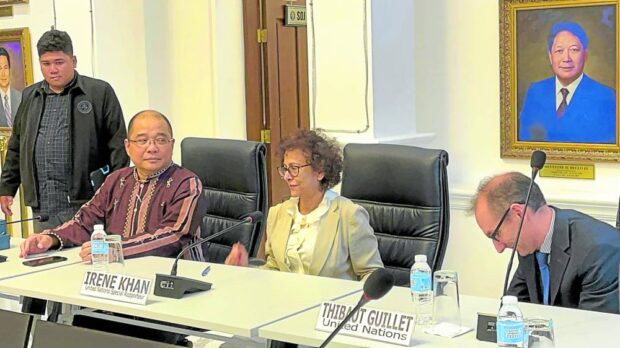De Lima to recount ordeal to UN official

SERIES OF MEETINGS After a dialogue with justice officials on Wednesday, UN Special Rapporteur Irene Khan is also scheduled to meet with former Sen. Leila de Lima, who will talk about her experience as a victim of fake news. —JANE BAUTISTA
Former Sen. Leila de Lima is set to meet with visiting UN Special Rapporteur on Freedom of Expression Irene Khan on Jan. 30 to discuss her experience as the “foremost victim” of defamation.
“I think [she] will be very much interested [in] my experience. I was the foremost victim of the trolls, the fake news, the vilification, and then how even some members of traditional media … were somehow used in demolishing my character,” De Lima told journalists at the Asia Women’s Forum 2024 on Thursday.
“I stand before you today only perhaps as a testament to the indomitable spirit that courses through the veins of every woman who has dared to dream of a world free from discrimination and oppression,” she said in her speech at the forum. “And I am here to testify to the many forms that such oppression can take.”
READ: Timeline: The ordeal of Leila de Lima
De Lima is expected to support the recommendation of civil society organizations that the National Task Force to End Local Communist Armed Conflict (NTF-Elcac) be abolished because it was supposedly being used to repress free speech.
“It has proven itself to be an instrument of oppression, an instrument of divisiveness, and then it’s known for Red-tagging, so it keeps people’s lives and security at risk,” she said.
Article continues after this advertisementKhan arrived in the country on Jan. 22, upon the government’s invitation, which pledged to “showcase the dynamism” of freedom of expression and opinion in the country.
Article continues after this advertisementREAD: After 6 years, De Lima free as court okays bail
On Wednesday, the UN special rapporteur met with officials of the Department of Justice (DOJ), which is purportedly expanding the participation of civil society organizations (CSOs) in addressing impunity and protecting human rights in the country.
In a press briefing on Thursday, Justice Undersecretary Raul Vasquez said treating CSOs with transparency, respect and honesty would promote collaboration, coordination and cooperation with the government to address criminality and human rights issues.
Red-tagging policy
During their dialogue, DOJ officials said Khan specifically asked whether the Philippine government has a policy on Red-tagging or the act of labeling individuals or groups as supporters or members of communist groups without concrete evidence.
“We explained [to her] that there is no policy of Red-tagging from this government. If there were individual cases that need to be addressed where Red-tagging happened, we ask that all of the complainants and the evidence be [submitted to] the DOJ and we will pursue appropriate cases,” Justice Undersecretary Jesse Andres said.
Before visiting the DOJ, Khan also went to the Supreme Court, where she was provided with a copy of the rules on the controversial Anti-Terrorism Act of 2022 and other related laws.
Chief Justice Alexander Gesmundo assured Khan that the Philippine judiciary was “highly cognizant of the universal principles of freedom of speech and expression” and that the “courts always seek to actively strike a balance between such freedoms and the right of the state to protect itself.”
The high tribunal has already struck down specific provisions of the Anti-Terrorism Act, or Republic Act No. 11479, as unconstitutional. However, certain aspects of free speech have not been touched upon because no specific case has been filed before the court.
“Actually, it said we can only rule upon on its face with respect to certain provisions that clearly violate freedom of expression. And therefore, we went on to strike down certain conditions which were vague in terms of the definition of the Anti-Terror Law. But I think you may have noticed that we did not rule on certain aspects of the Anti-Terror Law simply because we wanted to make sure that the balance between expression, opinion as well as security can come out in an actual case,” Senior Associate Justice Marvic Leonen told Khan.